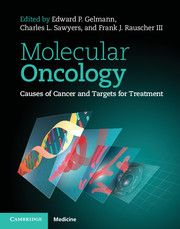Book contents
- Frontmatter
- Dedication
- Contents
- List of Contributors
- Preface
- Part 1.1 Analytical techniques: analysis of DNA
- Part 1.2 Analytical techniques: analysis of RNA
- Part 2.1 Molecular pathways underlying carcinogenesis: signal transduction
- Part 2.2 Molecular pathways underlying carcinogenesis: apoptosis
- Part 2.3 Molecular pathways underlying carcinogenesis: nuclear receptors
- Part 2.4 Molecular pathways underlying carcinogenesis: DNA repair
- Part 2.5 Molecular pathways underlying carcinogenesis: cell cycle
- Part 2.6 Molecular pathways underlying carcinogenesis: other pathways
- Part 3.1 Molecular pathology: carcinomas
- 42 Head and neck cancer
- 43 Lung cancer
- 44 Esophageal cancer
- 45 Gastric cancer
- 46 Small-bowel tumors: molecular mechanisms and targeted therapy
- 47 Colon and rectal cancer
- 48 Pancreatic cancer
- 49 Hepatocellular carcinoma
- 50 Renal-cell carcinomas
- 51 Bladder cancer
- 52 Prostate cancer
- 53 Targeted therapies in breast cancer
- 54 Molecular targets for epithelial ovarian cancer
- 55 Testicular cancer: germ-cell tumors (GCTs)
- 56 Cervical cancer
- Part 3.2 Molecular pathology: cancers of the nervous system
- Part 3.3 Molecular pathology: cancers of the skin
- Part 3.4 Molecular pathology: endocrine cancers
- Part 3.5 Molecular pathology: adult sarcomas
- Part 3.6 Molecular pathology: lymphoma and leukemia
- Part 3.7 Molecular pathology: pediatric solid tumors
- Part 4 Pharmacologic targeting of oncogenic pathways
- Index
- References
45 - Gastric cancer
from Part 3.1 - Molecular pathology: carcinomas
Published online by Cambridge University Press: 05 February 2015
- Frontmatter
- Dedication
- Contents
- List of Contributors
- Preface
- Part 1.1 Analytical techniques: analysis of DNA
- Part 1.2 Analytical techniques: analysis of RNA
- Part 2.1 Molecular pathways underlying carcinogenesis: signal transduction
- Part 2.2 Molecular pathways underlying carcinogenesis: apoptosis
- Part 2.3 Molecular pathways underlying carcinogenesis: nuclear receptors
- Part 2.4 Molecular pathways underlying carcinogenesis: DNA repair
- Part 2.5 Molecular pathways underlying carcinogenesis: cell cycle
- Part 2.6 Molecular pathways underlying carcinogenesis: other pathways
- Part 3.1 Molecular pathology: carcinomas
- 42 Head and neck cancer
- 43 Lung cancer
- 44 Esophageal cancer
- 45 Gastric cancer
- 46 Small-bowel tumors: molecular mechanisms and targeted therapy
- 47 Colon and rectal cancer
- 48 Pancreatic cancer
- 49 Hepatocellular carcinoma
- 50 Renal-cell carcinomas
- 51 Bladder cancer
- 52 Prostate cancer
- 53 Targeted therapies in breast cancer
- 54 Molecular targets for epithelial ovarian cancer
- 55 Testicular cancer: germ-cell tumors (GCTs)
- 56 Cervical cancer
- Part 3.2 Molecular pathology: cancers of the nervous system
- Part 3.3 Molecular pathology: cancers of the skin
- Part 3.4 Molecular pathology: endocrine cancers
- Part 3.5 Molecular pathology: adult sarcomas
- Part 3.6 Molecular pathology: lymphoma and leukemia
- Part 3.7 Molecular pathology: pediatric solid tumors
- Part 4 Pharmacologic targeting of oncogenic pathways
- Index
- References
Summary
Etiology
Although the worldwide incidence of gastric cancer has declined in recent years, it is still the second most frequent cause of cancer-related death in the world.
Environmental factors play critical roles in the pathogenesis of gastric cancer, with the major risk factors being Helicobacter pylori (H. pylori) infection, diet, and smoking (1). H. pylori infection is the most important single risk factor for gastric cancer development and has been defined as a Class 1 carcinogen by the World Health Organization (WHO). Populations with high incidences of gastric cancer can be found in geographic areas with high prevalence of H. pylori infection. High salt intake, often due to traditional diet in the form of salted fish, is the best-documented dietary risk factor for atrophic gastritis (2).
Epstein–Barr virus (EBV) infection is correlated with Burkitt’s lymphoma in Africa and nasopharyngeal carcinoma in South-East Asia. In addition, this virus has been recognized as an etiological agent in 5–10% of gastric cancers (3). Infectious agents, therefore, play important causative roles in gastric carcinogenesis.
- Type
- Chapter
- Information
- Molecular OncologyCauses of Cancer and Targets for Treatment, pp. 532 - 541Publisher: Cambridge University PressPrint publication year: 2013



